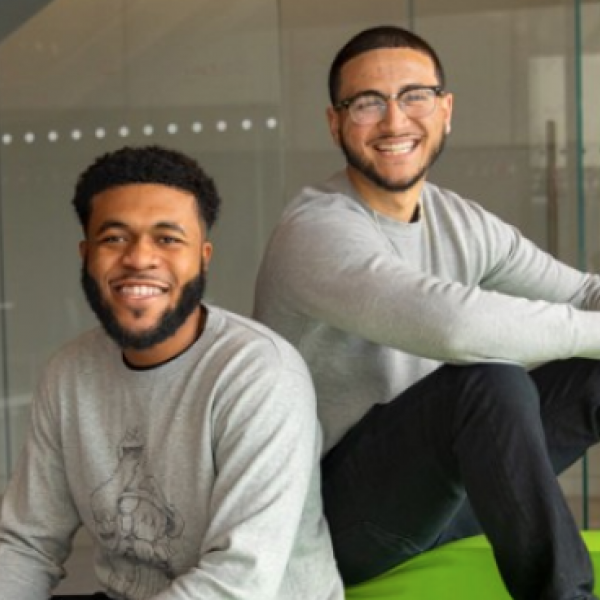Rami Abdou ’20 came to Cornell intending to major in computer science. But after he struggled in his first computing course, he considered switching majors, even though he loved the class. “I thought maybe this isn’t for me,” he said.
Then he had lunch with Jehron Petty ’20, a fellow computer science major, who urged him to stick with it. “He said, ‘You know you love this program,’” Abdou recalled. “He said, ‘Don’t be scared – leave that in the past.’”
Abdou stuck with it; now he and Petty are co-presidents of Underrepresented Minorities in Computing at Cornell (URMC), a club that seeks to support and inspire students of color in computer and information science.
For many underrepresented minorities – who in spring 2019 comprised nearly 13% of computer science majors – a dearth of fellow students who look like them, combined with subject matter they may not have encountered in high school, can be discouraging.
The Pre-Sophomore Summer Program in Computer Science, taking applications for this summer until Jan. 31, aims to help support students like Abdou. The all-expenses-paid four-week course will provide rising Cornell sophomores with instruction in discrete structures, computer system organization, programming and data structures – all with the goal of better preparing them for challenging sophomore-level computing classes.
“There’s a big step up from the introductory freshman courses,” said Éva Tardos, the Jacob Gould Schurman Professor of Computer Science.
With Hakim Weatherspoon, associate professor of computer science, and senior lecturer Anne Bracy, Tardos began developing the program after noticing that disproportionate numbers of underrepresented minorities were dropping sophomore computing courses. In addition to providing an academic boost, she said, the pre-sophomore program will help build a community of diverse students who can support each other.
It will also feature talks from faculty members about their research as well as networking opportunities, including a trip to New York City to tour the offices of Google and Amazon.
“I want to help the people who are unsure whether they belong in computing to do well, to be more secure and to eventually land amazing computing jobs, or do amazing startups or go to graduate school,” Tardos said. “Computing is a field that is in dire need of more people who are interested and willing to do it, and on the student side, there are amazing opportunities in whatever aspect of human life you want to affect.”
Any Cornell freshmen intending to major in computer science can apply to the program, with priority given to students who have taken CS 2110/2112. In addition to Tardos, Bracy and Weatherspoon, courses will be taught by Eshan Chattopadhyay, assistant professor of computer science, and Michael Clarkson, senior lecturer.
The pre-sophomore course will join existing Computing and Information Science programs aimed at diversifying the field. The SoNIC Summer Research Workshop, now in its 10th year, teaches undergraduate and master’s students state-of-the-art methodologies in cloud computing and data analytics; and the Summer School on Designing Technology for Social Impact explores designing technologies to promote positive social impact and alternative perspectives. Both programs seek to encourage diverse computer science students to pursue graduate-level research.
The pre-sophomore program will take place June 1-26, and participants from all three programs will attend research lectures and networking events together.
Cornell is also a partner in the FLIP Alliance (Diversifying Future Leadership in the Professoriate), an initiative funded by the National Science Foundation to diversify tenure-track faculty. FLIP focuses on encouraging effective diversity recruitment among the 11 universities, including Cornell, that supply about half the computer science faculty at the nation’s top schools.
A lack of diversity in computer science is a national problem, in both academia and industry. Although African American and Latino students are still underrepresented in Cornell’s computer science majors, the numbers are steadily growing: In 2018, nearly 11% of Cornell’s computer science majors were underrepresented minorities, compared with 7% in 2017.
Petty, who said he was shocked to discover as a freshman that he was one of only three African American students in a class of more than 400, hopes that programs like the pre-sophomore course can increase the numbers of students of color in computing, so future students feel like they fit in.
“Being one of the only black students didn’t make me not want to study computer science anymore, but it opened my eyes to the fact that I was a little bit of an anomaly, or a unicorn, in this space,” Petty said. “I realized what I cared about was paying it forward and helping other students get there.”
The program is sponsored by philanthropists Jeff Dean and Heidi Hopper; Google; Amazon; Goldman Sachs; and Microsoft.



